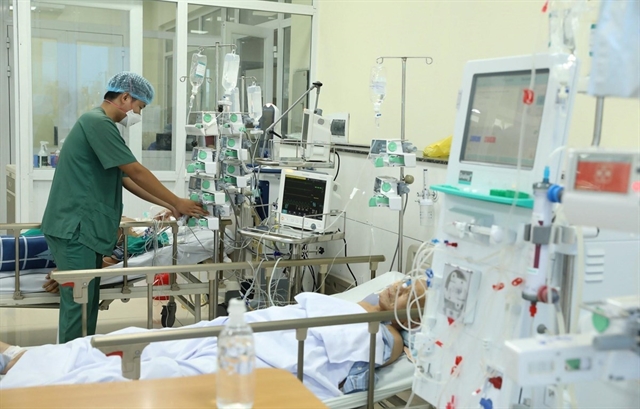 Society
Society

 |
| COVID-19 patients in intensive care at the National Hospital of Tropical Diseases in Hà Nội. — VNA/VNS Photo Minh Quyết |
HÀ NỘI — Amid a surge in infections, the Ministry of Health (MoH) has ordered a review of the treatment and examinations of COVID-19 cases.
The order came in an official document sent to directors of local health departments, hospitals under the management of the MoH, and health managers of ministries and departments.
At the moment, the number of coronavirus infections is increasing by up to 800 per day.
According to deputy health minister Nguyễn Thị Liên Hương, the number of critical and fatal cases is also on the rise.
Numerous localities have recorded patients infected with the new variants of the virus, which are much more contagious than the original.
New COVID-19 variants registered in Việt Nam are BA.4, BA.5, BA.2.75 and BA.2.12.1.
Following the report from the MoH subcommittee for treatment and expert council, the ministry requires authorities and hospitals to evaluate the situation and continue taking measures to minimise critical cases and fatalities, while also mitigating the risks for patients in medical facilities.
Areas for review include COVID-19 patient admission and examination, hospital bed arrangement, and medical staff allocation for optimal treatment.
Consultation among the medical facility’s doctors and upper-level hospitals is encouraged, but it is not recommended to transfer patients, which could lead to overloading.
Medical facilities also need to enhance measures to prevent cross-infection as much as possible, especially for patients in high-risk groups, intensive care or in need of surgery.
For cases where the rapid test result is negative but concerns about COVID-19 still remain, the MoH said that PCR testing is required, especially for patients with severe illnesses, to prevent widespread disease.
Provincial hospitals and facilities of the highest level in COVID-19 treatment need to examine and assess severe cases that must be hospitalised, send out test samples for genetic sequencing, and report to the MoH for suitable adjustments in guidelines.
According to statistics from the MoH, among the recent severe cases and deaths caused by COVID-19, around 35 per cent are partially or not vaccinated against the virus.
The ministry has been reviewing and advocating for vaccinations, especially among people in high-risk groups such as senior citizens, children, and those with underlying health conditions.
Deputy health minister Hương also said that vaccination progress is still slow in several localities, especially in terms of first and second doses for children aged five to 11, and booster shots for those aged 12 to 17.
Hương added: “The lesson learned from the past two years of pandemic control and prevention is that the World Health Organisation, and countries around the world, continue to affirm the effective and strategic role of vaccination against COVID-19, including its new variants.
“Many countries have administered the first and second booster shots for their population. More than 80 countries have given the COVID-19 vaccine to children aged five to 11, and some others for children below 5.”
For this reason, the MoH called for cities and provinces to enhance communication and highlight the benefits of vaccination against coronavirus, especially for people in high-risk groups and children. — VNS




